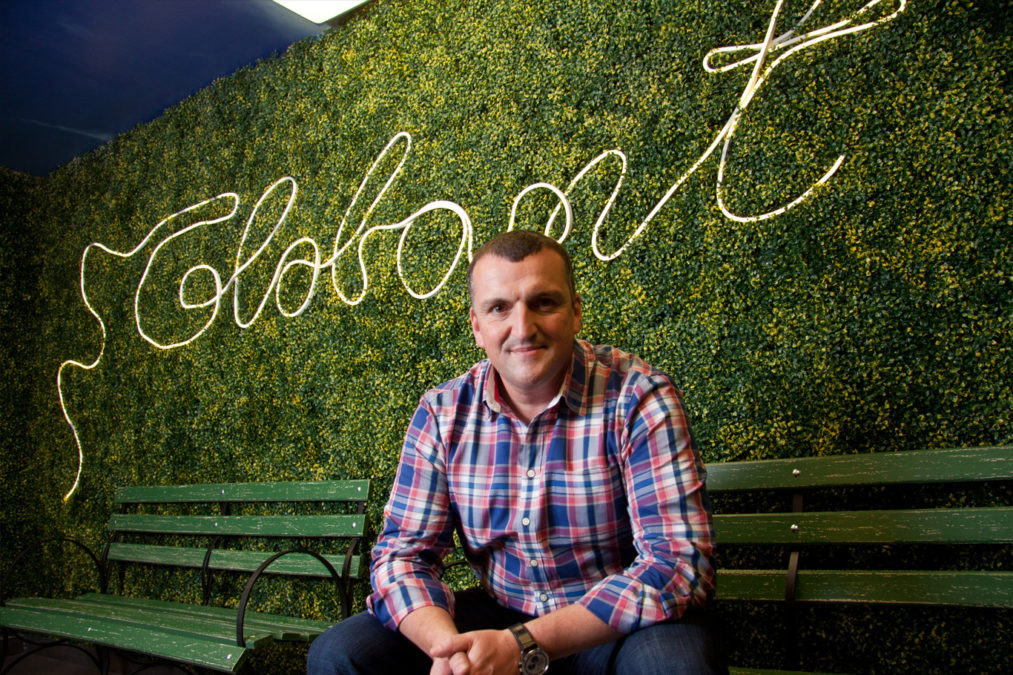Globant are what Martin Migoya describes as a “reinvention of the professional IT service provider”.
Beginning life in Buenos Aires, Argentina back in 2003, the company focuses on the cognitive application of artificial intelligence and digital transformation.
“We were born working for next generation companies,” says Migoya.

Blending design with engineering and innovation
Very early in the story, Google selected Globant to work with them — “we were the first company working for Google outside the Googleplex in California,” continues Migoya. And, this helped create a culture that was totally different from traditional IT service providers, such as Tata, Cognizant, Wipro and Accenture.
The company, now with more than 8,000 employees, is focused on digital transformation and it believes that to do that successfully, you need to foster a totally different, non-traditional culture.
“Blending design with engineering and innovation is our top priority,” says Migoya.
Technology has evolved a lot in the last 10-15 years and professional services organisations are still old-fashioned in many ways. Migoya points to Tesla reinventing the car manufacturing industry, claiming “we are reinventing the professional services industry”.

Migoya’s role
Migoya is one of the founders of the company, and the current CEO.
His role is to build the non-traditional culture, while creating the transformational vision for the company.
There is a significant market opportunity. “If you put together everything in the cognitive space plus all the digital transformation space, it will be worth around $5 trillion in the next five years.
On the map: IGEL making waves in the end user computing market
It comes down to three aspects: massive market opportunity, the “beautiful” scale of the company and Globant’s expertise in instigating transformational projects.
“Our aim is to change the world by doing what we love. And what we love is creating amazing experiences for consumers and amazing experiences for companies by transforming their business. So my job is that. It’s a beautiful job, I’m very lucky.”

The pressure on the CIO
IT’s role is changing, and so is the role of the CIO.
No longer are they expected to just maintain hardware or ‘keep the lights on’. There is an expectation of innovation.
“CEOs are putting pressure on CIOs to deliver innovation,” explains Migoya.
There are some companies who got this right from day one, such as Amazon and Disney. These organisations took an innovation-first approach, transforming the whole experience for their consumers.
But, on the other side, there are many other corporations that have been trying to change, pushed by their consumers, and have not been very successful.
“They have been circling around the old paradigms of how to do IT and technology and the new paradigms of how to do IT and technology,” says Migoya. This is where the opportunity comes for partners, such as Globant. These are the organisations that need help in transforming how they create technology, how they create software, how they create amazing digital journeys.
A FinTech case study: Finastra at work in the finance industry
Successful partners shouldn’t just pay attention to the technology, but also emphasise the cultural transformation that needs to happen behind that digital transformation.
Additionally, IT service providers shouldn’t presume to tell the organisation’s they help how to serve their own customers. These customers are experts in their own industry, but perhaps not as well versed in creating digital journeys for the customers — hence the collaboration with partners, such as Globant.
“Traditional IT service providers, they are all organised around industries” — Migoya
“We decided to organise our company not around verticals, but around studios,” says Migoya.
“Our studios are experts on mobile technology, artificial intelligence, big data, quality engineering, consumer experience or gaming — whatever we need to deploy the technology and to instigate the cultural change.
“We have one studio called future organisation, for example, which is a studio that takes care of transforming culture.

Automation key in the digital journey
Automation is a trend that’s happening right now, with what is called RPA or robotic process automation. The technology has been in the market for many years.
Businesses have the opportunity to replace “cheap hands with smart hands,” explains Migoya.
RPA and AI-led technologies are constantly improving, getting significantly cheaper and can help make huge gains on efficiency. These huge gains in efficiency are important in any digital (transformation) journey.
“Automation is a very conservative space,” continues Migoya. “It’s a space in which the seeds have been sown.”
Post-CRM: data helping improve enterprise sales execution and performance
Advice: tips on starting a successful business
“I don’t have the recipe for success, and in truth, there is none.
“What I can mention are three things that are very important.
“First, you have to have a lot of passion and love what you do; there are some entrepreneurs out there that I see sometimes complaining about their own business — this does not inspire success.
“Second, target a global market, a massive opportunity. So, even though you might start with a small chunk, it’s still relevant for your community. This is very important.
“The third is selecting the right team. Your partners need to complement your skills. If all your core founders are doing pretty much the same, then there’s a lack of DNA diversity that is needed to create a company.
“And then… a lot of hard work.”









